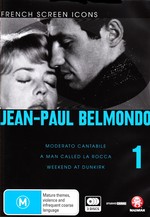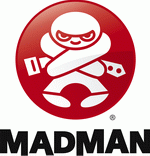French Screen Icons-Jean-Paul Belmondo-Volume 1 (1960) |
|
French Screen Icons-Jean-Paul Belmondo-Volume 1 (1960) |
|


|
| BUY IT |
This three disc set from Madman includes Moderato Cantabile (1960), A Man Called Rocca (1961) and Weekend At Dunkirk (1964). The films are a varied and interesting collection, including films that have never before been available on DVD in Australia.
Moderato Cantabile is a beautiful looking film with a haunting piano based score and sublime performances by two genuine stars of the French cinema: Jeanne Moreau and Jean-Paul Belmondo. The film is a gem that deserves to be better known. The video is superb for a 50 year old film, the audio is acceptable.
A Man Called Rocca feels like three separate stories cobbled together unevenly. Characters appear prominently, then disappear completely and new characters are thrown into the picture whose function is only to push the narrative in another direction. Still, the film has moments of interest and Jean-Paul Belmondo is always worth watching. The DVD has adequate video and audio. Weekend At Dunkirk is an interesting and unusual French war film, an intimate portrait of individuals in defeat full of stunning widescreen visuals, an interesting score by three times Oscar winner Maurice Jarre and Jean-Paul Belmondo. The video is very good for a 46 year old film, the audio is acceptable, except for the absence of the original French language track.
In this set we get a psychological drama, a crime story and a war film, showing Belmondo in widely diverse genres. The set is great value for fans of Belmondo or French cinema.
| Video | |
| Audio | |
| Extras | |
| Plot | |
| Overall |
Moderato Cantabile (1960) |
|


|
| BUY IT |
| General | Extras | ||
| Category | Crime | None | |
| Rating |

|
||
| Year Of Production | 1960 | ||
| Running Time | 90:32 | ||
| RSDL / Flipper | No/No | Cast & Crew | |
| Start Up | Menu | ||
| Region Coding | 4 | Directed By | Peter Brook |
|
Studio
Distributor |
 Madman Entertainment |
Starring |
Jeanne Moreau Jean-Paul Belmondo Pascale de Boysson Jean Deschamps Didier Haudepin Colette Régis Valeric Dobuzinsky |
| Case | Amaray-Transparent-Dual | ||
| RPI | ? | Music | Antonio Diabelli |
| Video | Audio | ||
| Pan & Scan/Full Frame | None | French Dolby Digital 2.0 mono (224Kb/s) | |
| Widescreen Aspect Ratio | 2.35:1 | ||
| 16x9 Enhancement |
 |
||
| Video Format | 576i (PAL) | ||
| Original Aspect Ratio | 2.35:1 | Miscellaneous | |
| Jacket Pictures | No | ||
| Subtitles | English | Smoking | Yes, constantly |
| Annoying Product Placement | No | ||
| Action In or After Credits | No | ||
Anne (Jeanne Moreau) is a bored middle class housewife trapped in an emotionless marriage to a wealthy industrialist. One day as she takes her pre-teen son to his piano lessons, a woman is murdered in the workmen’s bar next door in a seeming crime of passion. Anne is fascinated by this glimpse of another, more dangerous world and revisits the bar the next day where she meets Chauvin (Jean-Paul Belmondo), a witness to the murder. Anne is intrigued, wanting to know more about the killing of the woman by her lover and their back story and Chauvin seems willing to fill in the details, even if he has to make them up. Yet while Anne knows nothing about him, it appears that Chauvin knows quite a lot about Anne and may even have been watching her for some time. As Anne is drawn into his world she starts to fall in love with him but the more she seeks him out, the more he starts to push her away. After seven days, and seven nights, things come to a head.
“Moderato Cantabile” is a musical term for playing “gently, melodiously” and Moderato Cantabile (aka Seven Days . . . Seven Nights) is indeed a gently building psychological drama with a hint of menace. Although it was directed by Englishman Peter Brook (Lord of the Flies 1963)), the film is a fine, if underappreciated, example of the French New Wave cinema.
Moderato Cantabile is a beautiful looking film, wonderfully photographed by veteran cinematographer Armand Thirard (The Wages of Fear (1953), And God Created Woman (1956)). He uses the widescreen frame to excellent effect, portraying the bleak winter landscape of barren trees, growing at an angle due to the prevailing winds, the almost deserted harbour and docks as a reflection of the barrenness within Anne’s loveless existence. Indeed, although this film is part of the Belmondo DVD collection, Jeanne Moreau has top billing and she is superb, her longing and vulnerability evident in every frame; in one long, dialogue-less scene the camera lingers upon her face as the emotions play across her features. Moreau won the Best Actress award at Cannes in 1960 for this role before going on to star in the better known Jules and Jim for Francois Truffaut in 1962. In what is essentially a two hander, Belmondo’s Chauvin has less to do but is handsome, charismatic and enigmatic, with a hint of menace, and the attraction between the two doomed opposites is palpable.
Moderato Cantabile is beautiful looking film with the sparse piano based score by Antonio Diabelli adding a haunting mood to the visuals. It is wonderfully acted by two stars of the French cinema and is a gem that deserves to be better known.
Jean-Paul Belmondo is a genuine screen icon, an actor who appeared in over 80 films in a career that stretched between 1956 and 2008. No matter the film or genre, he was the epitome of “cool”, the nearest equivalent in English language films probably being Steve McQueen. Now, with this three disc set French Screen Icons: Jean-Paul Belmondo 1 from Madman that includes Moderato Cantabile (1960), A Man Called Rocca (1961) and Weekend At Dunkirk (1964) we have a chance to see what the fuss was about.
Moderato Cantabile is presented in an aspect ratio of 2.35:1, the original theatrical ratio, and is 16x9 enhanced.
This is a fabulous black and white print with stunning widescreen visuals courtesy of cinematographer Armand Thirard. The print is very sharp and has fine detail, solid blacks and excellent shadow detail. The black and white images were almost luminous, and such is their depth that many appear almost 3D, leaping off the screen. There was the expected film grain, some aliasing on rails and a slight contrast variation (about 51:03) but I noticed no obvious dirt marks or other artefacts. For a film that is 50 years old, I was stunned by the quality of the visuals.
English subtitles are in a yellow font. I noticed no obvious spelling or grammatical errors, although occasionally the timing with the French dialogue seemed slightly off.
| Sharpness | |
| Shadow Detail | |
| Colour | |
| Grain/Pixelization | |
| Film-To-Video Artefacts | |
| Film Artefacts | |
| Overall |
Audio is a French Dolby Digital 2.0 mono at 224 Kbps. This is a film of dialogue and silences, and the track does its job without fuss. Dialogue is clear, the effects were predictably dull. The sparse piano sonata however came across nicely. There was obviously no surround or subwoofer use.
As noted, the piano based score by Antonio Diabelli has haunting but sparsely used, providing a memorable support for the visuals.
Lip synchronisation was fine.
| Dialogue | |
| Audio Sync | |
| Clicks/Pops/Dropouts | |
| Surround Channel Use | |
| Subwoofer | |
| Overall |
None
NOTE: To view non-R4 releases, your equipment needs to be multi-zone compatible and usually also NTSC compatible.
The only other release of Moderato Cantabile I can find is an all-Region version in the same correct aspect ratio, with French language audio and English and Korean subtitles. There is no reason to go past our release, which adds another two Belmondo films in the same package.
I cannot find an equivalent Belmondo collection listed on sales sites. The only thing close is a Region 2 UK collection that includes Breathless, Pierrot Le Fou, Le Professional, Stavisky and A Double Tour.
Moderato Cantabile is a beautiful looking film with a haunting piano based score and sublime performances by two genuine stars of the French cinema. The film is a gem that deserves to be better known.
The video is superb for a 50 year old film, the audio is acceptable. There are no extras but the film is presented in a box set with two other films, which is great value for fans of Belmondo or French cinema.
Moderato Cantabile is included in the three disc set French Screen Icons: Jean-Paul Belmondo 1 from Madman that also includes A Man Called Rocca (1961) and Weekend At Dunkirk (1964).
| Video | |
| Audio | |
| Extras | |
| Plot | |
| Overall |
| Review Equipment | |
| DVD | Sony BDP-S580, using HDMI output |
| Display | LG 55inch HD LCD. This display device has not been calibrated. This display device is 16x9 capable. This display device has a maximum native resolution of 1080p. |
| Audio Decoder | NAD T737. This audio decoder/receiver has not been calibrated. |
| Amplification | NAD T737 |
| Speakers | Studio Acoustics 5.1 |
A Man Called Rocca (1961) |
|


|
| BUY IT |
| General | Extras | ||
| Category | Crime | None | |
| Rating |

|
||
| Year Of Production | 1961 | ||
| Running Time | 102:01 | ||
| RSDL / Flipper | Dual Layered | Cast & Crew | |
| Start Up | Menu | ||
| Region Coding | 4 | Directed By | Jean Becker |
|
Studio
Distributor |
 Madman Entertainment |
Starring |
Jean-Paul Belmondo Christine Kaufmann Pierre Vaneck Béatrice Altariba Henri Virlojeux Mario David Nico Pedro Serano Charles Moulin Jean-Pierre Darras Edmond Beauchamp Jacques Léonard |
| Case | Amaray-Transparent-Dual | ||
| RPI | ? | Music | Claude Normand |
| Video | Audio | ||
| Pan & Scan/Full Frame | None | French Dolby Digital 2.0 mono (224Kb/s) | |
| Widescreen Aspect Ratio | 1.66:1 | ||
| 16x9 Enhancement |
 |
||
| Video Format | 576i (PAL) | ||
| Original Aspect Ratio | 1.66:1 | Miscellaneous | |
| Jacket Pictures | No | ||
| Subtitles | English | Smoking | Yes |
| Annoying Product Placement | No | ||
| Action In or After Credits | No | ||
Retired criminal Roberto La Rocca (Jean-Paul Belmondo) is told that his hot headed friend Xavier Abe (Pierre Vaneck) has been framed for murder by his partner Villanova (Nico) and is awaiting trial. Rocca returns to the city where he seduces Villanova’s girl Maud (Beatrice Altariba), shoots and kills Villanova and takes over the gambling club previously run by Xavier and Villanova. He also renews his acquaintance with Xavier’s beautiful sister Genevieve (Christine Kaufmann). Meanwhile, Xavier is found guilty and sentenced to 10 years in prison. When standover thugs threaten the gambling club, Rocca shoots them and is sentenced to prison. In prison Rocca and Xavier meet up, suffer solitary and volunteer to clear land mines. Xavier loses an arm in an explosion, they receive remission because of their mine clearing, are released and settle down in a farm with Genevieve. But Xavier has an idea, which leads to tragedy.
A Man Called Rocca is directed by Jean Becker (whose first film this was) based on the novel L’excommunie by Jose Giovanni. As a movie it has way too much plot, and in fact it feels like three separate stories cobbled together unevenly; the revenge plot, the prison experience and the final section after their release. Characters appear prominently, then disappear completely, and new characters are thrown into the picture without preliminaries or presaging even as late as the 90 minute mark, characters whose function is only to push the narrative in another direction. I have not read the book, but I would expect that these characters in a novel would have better introductions and motivations. Author Giovanni was unhappy with this screen adaption of his novel and ten years after this film, in 1972, Giovanni himself directed the movie La Scoumoune based on his own book, again staring Belmondo. La Scoumoune is available in the three disc set French Screen Icons: Jean-Paul Belmondo 2 from Madman, and will be reviewed on this site later this month.
Jean-Paul Belmondo is a genuine screen icon, an actor who appeared in over 80 films in a career that stretched between 1956 and 2008. No matter the film or genre, he was the epitome of “cool”, the nearest equivalent in English language films probably being Steve McQueen. In A Man Called Rocca he looks very young, is handsome, cheeky, charismatic and lights up the screen. His scenes with the mine clearance team are quite tense and well-staged. Pierre Vaneck as Xavier also does well, but no-one else really gets enough screen time to stand out.
A Man Called Rocca , despite the plot challenges mentioned above, has moments of interest and Belmondo is always worth watching.
A Man Called Rocca is included in the three disc set French Screen Icons: Jean-Paul Belmondo 1 from Madman that also includes Moderato Cantabile (1960) and Weekend At Dunkirk (1964).
A Man Called Rocca is presented in an aspect ratio of 1.66:1, which I believe is the original theatrical ratio, and is 16x9 enhanced.
This is a reasonable black and white print. In the early out door shots the film lacks sharpness and has copious grain but the later indoor and set sequences are sharp and detailed. Later, in the outdoor mine sequences, the film is again softer. Blacks and shadow detail are acceptable. There is the occasional scratch and odd dirt mark, some aliasing and infrequent ghosting (see 101:27 for example) but nothing too distracting. For a 50 year old film it was quite good.
English subtitles are in a yellow font. I noticed no obvious spelling or grammatical errors, although their timing with the French dialogue seemed slightly slow. There were also a couple of dialogue scenes in Spanish. When they occurred, burned in white subtitles translated the Spanish into French and the yellow English subtitles were overlayed.
| Sharpness | |
| Shadow Detail | |
| Colour | |
| Grain/Pixelization | |
| Film-To-Video Artefacts | |
| Film Artefacts | |
| Overall |
Audio is a French Dolby Digital 2.0 mono at 224 Kbps. Dialogue is clear, the effects such as gunshots were quite dull. In contrast, vehicle engines were quite good. There was obviously no surround or subwoofer use. While nothing special, the audio does the job.
The music by Claude Normand was accordion based and does sound dated.
Lip synchronisation was good.
| Dialogue | |
| Audio Sync | |
| Clicks/Pops/Dropouts | |
| Surround Channel Use | |
| Subwoofer | |
| Overall |
None
NOTE: To view non-R4 releases, your equipment needs to be multi-zone compatible and usually also NTSC compatible.
I cannot at this time find another English friendly release of the film. A Region 2 French release does not seem to have English subtitles.
I also cannot find an equivalent Belmondo collection listed on sales sites. The only thing close is a Region 2 UK collection that includes Breathless, Pierrot Le Fou, Le Professional, Stavisky and A Double Tour.
A Man Called Rocca feels like three separate stories cobbled together unevenly. Characters appear prominently, then disappear completely and new characters are thrown into the picture without preliminaries whose function is only to push the narrative in another direction. Still, the film has moments of interest and Belmondo is always worth watching. .
The DVD has adequate video and audio. There are no extras but the film is presented in a box set with two other films, which is great value for fans of Belmondo or French cinema.
A Man Called Rocca is included in the three disc set French Screen Icons: Jean-Paul Belmondo 1 from Madman that also includes Moderato Cantabile (1960) and Weekend At Dunkirk (1964).
| Video | |
| Audio | |
| Extras | |
| Plot | |
| Overall |
| Review Equipment | |
| DVD | Sony BDP-S580, using HDMI output |
| Display | LG 55inch HD LCD. This display device has not been calibrated. This display device is 16x9 capable. This display device has a maximum native resolution of 1080p. |
| Audio Decoder | NAD T737. This audio decoder/receiver has not been calibrated. |
| Amplification | NAD T737 |
| Speakers | Studio Acoustics 5.1 |
Weekend at Dunkirk (1964) |
|


|
| BUY IT |
| General | Extras | ||
| Category | War Drama | None | |
| Rating |

|
||
| Year Of Production | 1964 | ||
| Running Time | 118:14 | ||
| RSDL / Flipper | No/No | Cast & Crew | |
| Start Up | Menu | ||
| Region Coding | 4 | Directed By | Henri Verneuil |
|
Studio
Distributor |
 Madman Entertainment |
Starring |
Jean-Paul Belmondo Catherine Spaak Georges Géret Jean-Pierre Marielle Pierre Mondy Marie Dubois Christian Barbier François Guérin Kenneth Haigh Ronald Howard Jean-Paul Roussillon Albert Rémy |
| Case | Amaray-Transparent-Dual | ||
| RPI | ? | Music | Maurice Jarre |
| Video | Audio | ||
| Pan & Scan/Full Frame | None | English Dolby Digital 2.0 mono (224Kb/s) | |
| Widescreen Aspect Ratio | 2.35:1 | ||
| 16x9 Enhancement |
 |
||
| Video Format | 576i (PAL) | ||
| Original Aspect Ratio | 2.35:1 | Miscellaneous | |
| Jacket Pictures | No | ||
| Subtitles | None | Smoking | Yes |
| Annoying Product Placement | No | ||
| Action In or After Credits | No | ||
Weekend At Dunkirk (Week-end a Zuydcotte), based on the award winning novel by Robert Merle, is set over two days, Saturday and Sunday, 1 and 2 June 1940, when the German forces invading France had pushed the British and French armies back to the beaches around Dunkirk. There, relentlessly shelled and attacked from the air, the exhausted soldiers wait for the chance to be evacuated by small boats to safety across the channel to England.
In what is basically a plot-less narrative, Weekend At Dunkirk follows the footsteps of French Sergeant Julien Maillet (Jean-Paul Belmondo) who, separated from his unit, tries to get onto a boat to freedom. Over the course of the two days Maillet encounters a range of the flotsam thrown up by the German advance including a scrounger, a priest, a machine gunner, a British soldier who refuses to leave his French wife behind, German 5th columnists dressed as nuns, English officers, rapists and Jeanne (Catherine Spaak), an attractive woman who refuses to leave the family home. These characters intersect, and re-intersect with Maillet in various ways as he seeks a place on that illusive boat to England.
While the film may have a sparse plot, the widescreen visuals are anything but! The film set encompasses a wide beach and sand dunes with ruined buildings, often on fire, behind. Cinematographer Henri Decae, who had long career working with greats such as Truffaut (The 400 Blows (1959) and Jean-Pierre Melville (in the Alain Delon classic Le Samourai (1967)) creates stunning visuals that are simply astonishing: every scene, even intimate ones with a couple of people talking, features amazing depth and detail in the back ground: long lines of soldiers, wrecked vehicles, burning buildings, explosions, ships and aircraft. In pre-CGI days, all this is real and I have seldom seen a war film, much less a French one on a far more limited budget than is usual in Hollywood, with so much detail and movement in all the backgrounds during most of the 2 hour running time. I seem to remember that Atonement’s (2007) sequence set in Dunkirk was greatly praised - Weekend At Dunkirk does it without CGI and over a much longer period. There are quibbles: the German aircraft are referred to as Stukas, which the planes used in the film certainly are not, but I believe that by the 1960s no Stukas were still flying, so without CGI the film would have needed to use models (such as the fake looking Stuka sequence in The Battle of Britain(1969)). Instead, we have real aircraft making low level strafing runs over the beaches, and if they are not genuine German aircraft from WWII the sequences are still spectacular in their own right.
As well as the visuals, the film features an interesting score from prolific composer Maurice Jarre (winner of three Oscars for his work with David Lean in Lawrence of Arabia (1959), Doctor Zhivago (1965) and A Passage to India (1984)). By interesting, I mean that Jarre contributes an electronic score that is playful, rather than dramatic, sounding like something one might hear at a fairground. While it occasionally feels a bit odd, the suggestion, enhanced by the detailed visuals, that the Dunkirk evacuation with its chaos and misunderstandings was some kind of carnival enhances the decided anti-war feel of the film. For this is not a film about heroism, but about individuals facing terror, disillusionment and defeat in various ways.
Another plus is Jean-Paul Belmondo, who is never off screen. Belmondo is a genuine screen icon, an actor who appeared in over 80 films in a career that stretched between 1956 and 2008. No matter the film or genre, he was the epitome of “cool”, the nearest equivalent in English language films probably being Steve McQueen. In Weekend At Dunkirk he is handsome and charismatic, but the “tough guy” persona is absent and he is not an action hero. Indeed, he is not really the catalyst of the film’s action, but rather the almost passive recipient of the actions and activities of others. Perhaps these understated roles are the hardest for leading men (which Belmondo at this stage certainly was) to pull off and here he does well and is always very watchable.
Weekend At Dunkirk is an interesting and unusual French war film, an intimate portrait of individuals in defeat full of stunning widescreen visuals, an interesting score and the wonderful Jean-Paul Belmondo.
Weekend At Dunkirk is included in the three disc set French Screen Icons: Jean-Paul Belmondo 1 from Madman that also includes Moderato Cantabile (1960) and A Man Called Rocca (1961).
Weekend At Dunkirk is presented in an aspect ratio of 2.35:1, the original theatrical ratio, and is 16x9 enhanced.
The print looks good and the widescreen images are stunning if slightly soft. Colours are natural, if a bit washed out and muted, detail acceptable. Blacks are good and as there are no dark scenes, the film mostly taking place outside in daylight, shadow detail is not an issue. Contrast and brightness occasionally vary, and there is evidence of edge-enhancement and occasional small marks, but nothing distracting. Overall, a satisfying representation of a 46 year old film.
There are no subtitles.
| Sharpness | |
| Shadow Detail | |
| Colour | |
| Grain/Pixelization | |
| Film-To-Video Artefacts | |
| Film Artefacts | |
| Overall |
The audio is disappointing because the original French audio track is not offered. Instead, the only audio available is an English Dolby Digital 2.0 mono at 224 Kbps. This really is a pity.
Dialogue is easy to understand, but of course is an English dub, and not a particularly good one at that. The effects, such as explosions from air attack and shelling, the vehicle noises and the actual air attacks come across with some depth and are pretty good. There was no surround or subwoofer use.
As noted, the electronic score by Maurice Jarre was interesting and came across cleanly.
As this was the English dub of original French language, lip synchronisation was poor.
| Dialogue | |
| Audio Sync | |
| Clicks/Pops/Dropouts | |
| Surround Channel Use | |
| Subwoofer | |
| Overall |
None
NOTE: To view non-R4 releases, your equipment needs to be multi-zone compatible and usually also NTSC compatible.
There does not appear to be another English friendly release of Weekend At Dunkirk as the only other versions of the film I can find are a couple of Region 2 French releases. They have French language audio but no English subtitles.
I cannot find an equivalent Belmondo collection listed on sales sites. The only thing close is a Region 2 UK collection that includes Breathless, Pierrot Le Fou, Le Professional, Stavisky and A Double Tour.
Weekend At Dunkirk is an interesting and unusual French war film, an intimate portrait of individuals in defeat full of stunning widescreen visuals, an interesting score by three times Oscar winner Maurice Jarre and the wonderful Jean-Paul Belmondo.
The video is very good for a 46 year old film, the audio is acceptable, except for the absence of the original French language track. There are no extras but the film is presented in a box set with two other films, which is great value for fans of Belmondo or French cinema.
Weekend At Dunkirk is included in the three disc set French Screen Icons: Jean-Paul Belmondo 1 from Madman that also includes Moderato Cantabile (1960) and A Man Called Rocca (1961).
| Video | |
| Audio | |
| Extras | |
| Plot | |
| Overall |
| Review Equipment | |
| DVD | Sony BDP-S580, using HDMI output |
| Display | LG 55inch HD LCD. This display device has not been calibrated. This display device is 16x9 capable. This display device has a maximum native resolution of 1080p. |
| Audio Decoder | NAD T737. This audio decoder/receiver has not been calibrated. |
| Amplification | NAD T737 |
| Speakers | Studio Acoustics 5.1 |